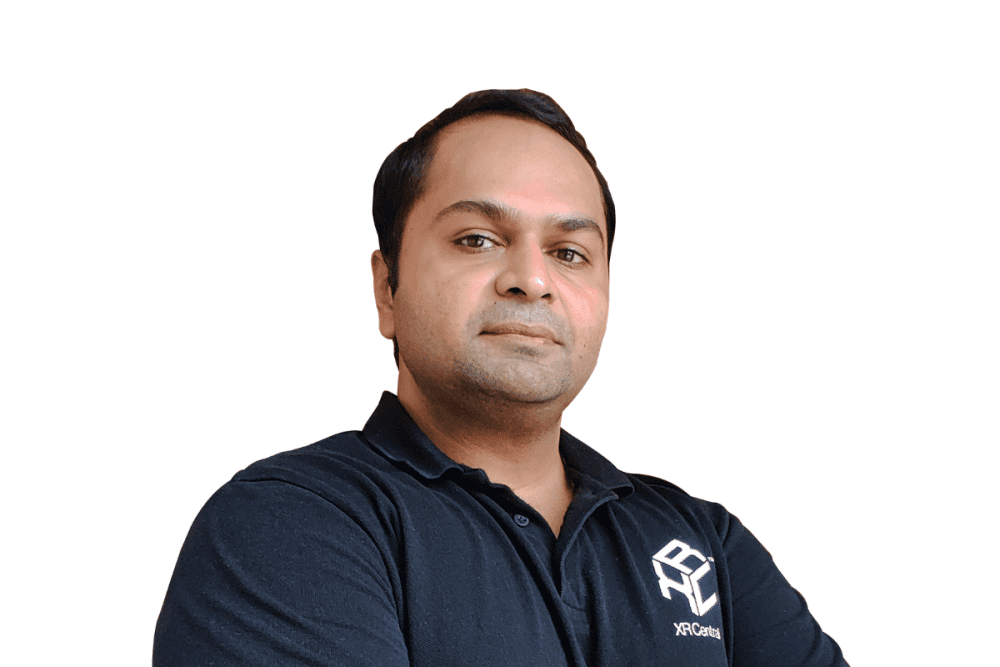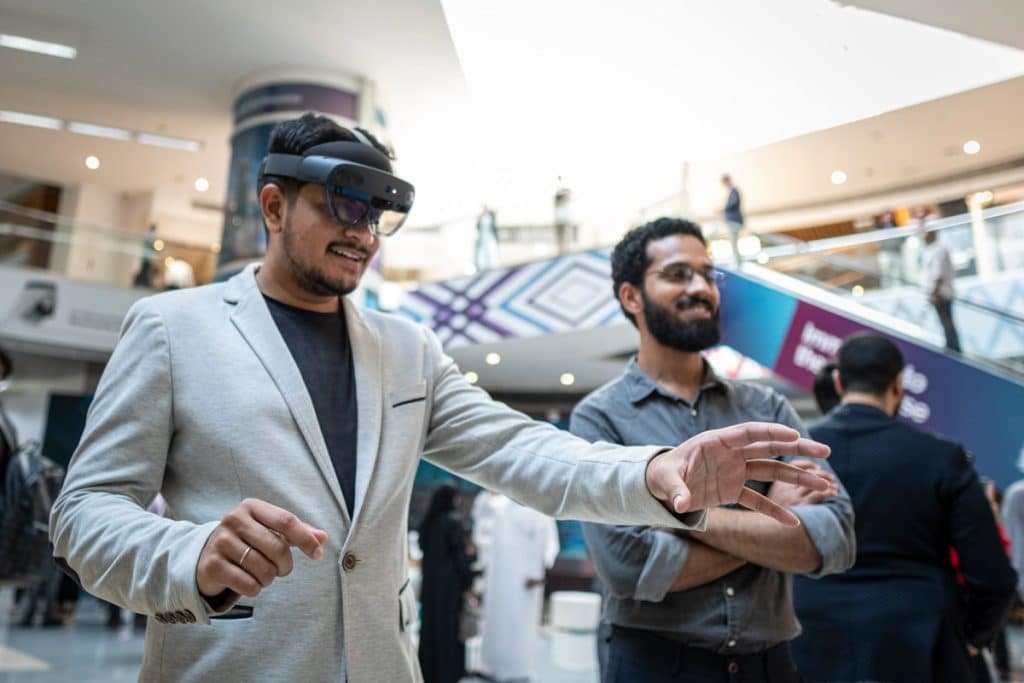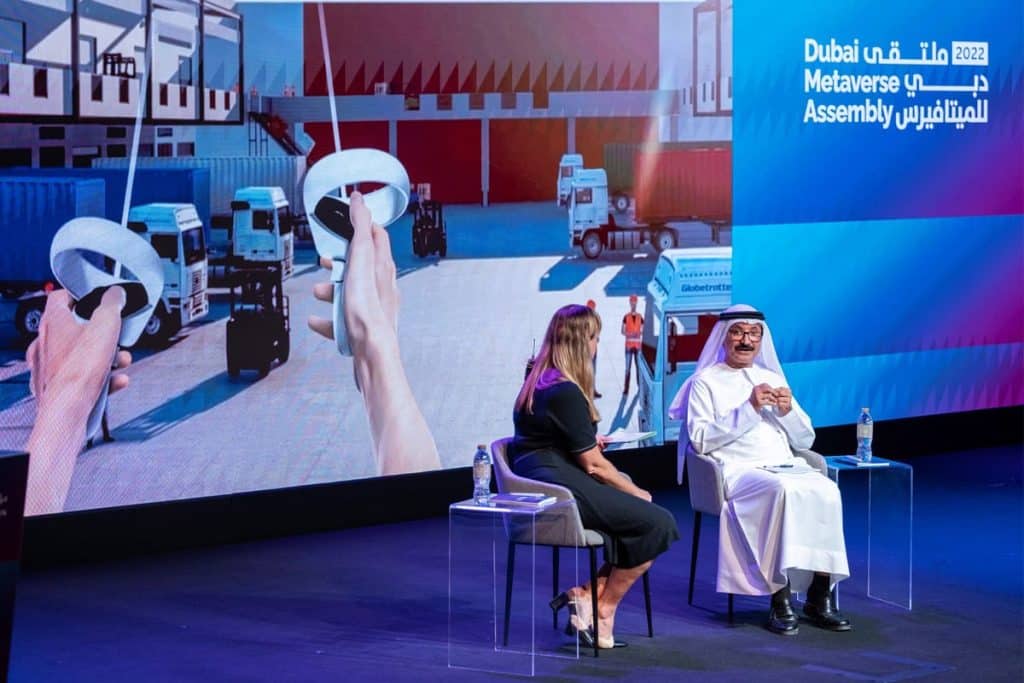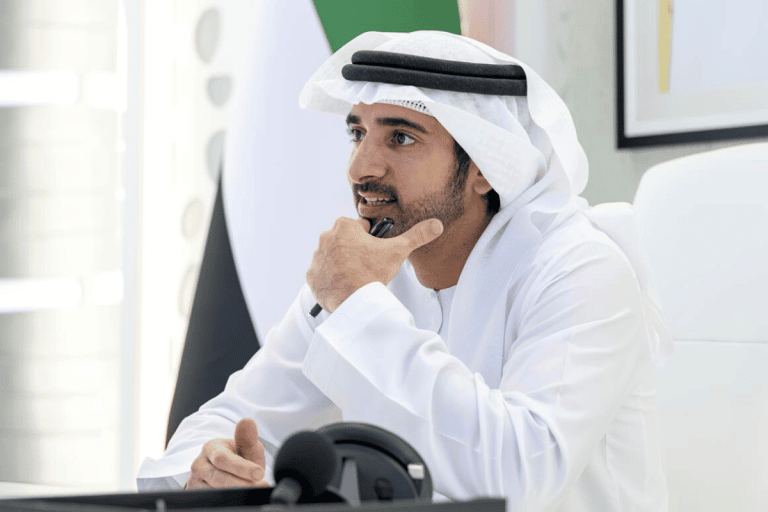The emergence of Web 3 and the metaverse will have “endless” possibilities of how it could impact industries and communities in the UAE, experts told the Arabian Business UAE Forum.
Dubai’s recently announced plan to boost the contribution of the metaverse to the economy to $4 billion by 2030 will be supportive of the emirate’s overall growth and improve the lives of residents, experts explained.
Announced in June by Dubai Ruler Sheikh Mohammed bin Rashid Al Maktoum, the strategy aims at ensuring that the metaverse increases its contribution to 1 percent of the emirate’s overall GDP. Headed by the Dubai Crown Prince Sheikh Hamdan bin Mohammed bin Rashid Al Maktoum, the strategy is built around five pillars – innovation, government implementation of metaverse technologies and talent development.

The strategy includes doubling the number of blockchain companies in Dubai, as well as creating 40,000 jobs in the sector.
The Dubai Metaverse Strategy was unveiled at the Dubai Metaverse Assembly on September 28, to be one of the leading economies and a major hub for the global metaverse community.
In a keynote by Omar bin Sultan Al Olama, Chairman of Dubai Chamber of Digital Economy and Vice Chairman of the Higher Committee for Future Technology and Digital Economy in Dubai, Dubai’s Metaverse Strategy was shared with attendees at the Dubai Metaverse Assembly, in the presence of Sheikh Hamdan bin Mohammed bin Rashid Al Maktoum, Crown Prince of Dubai.
Dubai’s geographical size is limited which could have been considered as a constraint to expansion however, it is on the contrary.
“The population of Dubai in the metaverse is similar to that of India in the metaverse or China in the metaverse,” said Omar bin Sultan Al Olama.
30 years ago music was stored in 90 minutes per cassette, today 100 billion hours of music is available in the click of a button on smartphones, the technological potential for the future is endless, he explained.
Dubai aims to be one of the leading global economies in the metaverse and aims to spread its progress and success globally. The city is already setting strong foundations for the metaverse to thrive, by exploring opportunities around infrastructure, education, technology, and more.
The Dubai Metaverse Strategy focuses on four sectors:
- tourism,
- education,
- government services and
- retail & real estate.
A tourism task force will be launched by the UAE for the metaverse, to enhance the tourism industry.
The Ministry of Economy also announced a service centre on the metaverse, aimed to enhance virtual government services.
Dubai is also introducing the city’s digital twin in the metaverse, to simulate actions and decisions virtually before bringing it to reality, enhancing the retail and real estate sector.
Hot on the foot of Dubai’s Metaverse plans, here are all the latest metaverse trends and announcements from recent months:
- UAE Ministry of Economy to set up shop in the metaverse
- Metaverse focussed Indian ventures set to enter the UAE market
- Major announcements by leading companies at the Dubai Metaverse Assembly
- Latest metaverse trend: Digital only shoes
- DP World to use metaverse technology to solve supply chain challenges and expand reach
- Emirates to hire 4,000 new cabin crew to train in the metaverse
UAE Ministry of Economy to set up shop in the metaverse
The UAE Ministry of Economy is set to launch its third address – this time in the metaverse.
Emirati minister Abdulla bin Touq Al Marri said they are “setting up” a service location in the digital world, which will “offer the full experience.”
“We have one physical location in Dubai, one in Abu Dhabi and we are setting up the third in the metaverse,” he said during a panel discussion at the Dubai Metaverse Assembly on Wednesday.
The new location has an auditorium, and can hold meetings, contract signings and more, the minister added.
Al Marri explained the new service centre will be an immersive environment where people can walk around, get their tokes, interact with others, and avail services just as they could in physical locations.
The Emirati minister was speaking at a panel with Mark Zaleski, managing director and partner at BCG Digital Ventures, Bashar Kilani, managing director at Accenture. The panel was about the economic opportunities in the metaverse.
Metaverse focussed Indian ventures set to enter the UAE market
Indian ventures specialising in metaverse are firming up plans to enter the UAE market, with ambitious plans to expand into the larger Middle East market, amid Dubai’s high-decibel campaign to make it a metaverse hub.
Delhi-based XR Central, specialising in technology creation for various industries, is the latest one deciding to enter the UAE, with long-term growth plans in the region.
“We know for a fact that UAE – and the larger Middle East – is going to be one of the largest markets for metaverse and hence our strategy is simple – to be early and capture the market share,” Anshul Agarwal, co-founder and director, XR Central, told Arabian Business.
“You will see XR Central’s presence more and more in the region in times to come,” Agarwal said, revealing the startup’s ambitious expansion plans in the Middle East.

XR Central said it has earmarked $5 million for its initial growth plans in the UAE, GCC region.
Industry insiders said several more startups and ventures specialising in various segments of metaverse are seriously looking to expand their operations to the UAE, while Indian startups already operating in the UAE such as ShopDoc have launched ‘My School Clinix’ – a metaverse healthcare venture for schools, recently.
XR Central plans to make its debut in the UAE market during the forthcoming GITEX in Dubai, with a high-decibel launch of its latest product – MetaQube, a ‘do-it-youself’ (DIY) – or no code online metaverse platform – for companies to build their products and projects.
“We will be launching the Beta version of our platform, MetaQube, at GITEX in Dubai next month. We plan to make a buzz in the event with our product,” Agarwal said.
Agarwal also revealed that XR Central has plans to set up a regional office in the Middle East.

Agarwal said the startup would also look at entering into strategic tie-ups in UAE and GCC for faster growth and market penetration in the region.
“We are open for any kind of strategic alliances, as our vision is to help companies fast track their journeys to the metaverse ecosystem, utilising our product MetaQube,” he said.
He said the use cases of the startups’ metaverse product range from building highly immersive experience centers to digital twins, training and meeting spaces, metaverse museums, art galleries, sports fan meet and greet in the new 3D dimension.
Agarwal said the target companies for XR Central’s MetaQube would be mainly those in the tourism, IT, technology, sports events, manufacturing, FMCG and consumer electronics sectors.
XR Central, which already works with leading brands such as Mercedes Benz, Spicejet, Accenture, Siemens and De Beers group, to piggyback their growth strategy in the UAE and Middle East with them.
“Most of them are multinationals with offices across the globe,” he said.
Sports events will be another focus sector for XR Central in the Middle East region.
“We had recently tied up with IPL franchise Lucknow Super Giant and delivered a fantastic fans meet and greet experience. With such metaverses, we are well positioned to create the future metaverses for any sporting events like cricket, soccer, boxing, and so on,” Agarwal said.
The entry plans of Indian ventures could give further boost to Dubai’s ambitious metaverse strategy, which aims to add $4 billion to the emirate’s GDP, support 40,000 virtual jobs by 2030 and attract 1,000 companies specialising in blockchain technologies to turn it into one of the world’s top 10 metaverse economies.
Dubai is currently holding a high-decibel global event – Dubai Metaverse Assembly – with participation of experts from around the world as part of its efforts to promote its strategy for the sector.
Major announcements by leading companies at the Dubai Metaverse Assembly
Over the course of the two-day event, more than 15 initiatives and strategies were launched. Leading companies and government entities used the platform to make major announcements of their expansion into the metaverse.
Gabriel Abed, Ambassador of Barbados to the UAE, revealed that the island nation was entering the metaverse with a new virtual embassy.
“Our metaverse embassy will create diplomatic parity for Barbados,” said Abed.
“It will empower developing nations to gain diplomatic representation at the same level as larger nations, without vast budgets or infrastructure,” he added.
Emirates revealed its plan to hire 4000 new cabin crew and train them in the metaverse. Adel Ahmed Al Redha, chief operating officer of Emirates said that the virtual world will transform processes which will allow elimination of middlemen. Whether through the launch of NFTs or by offering new immersive experiences, Emirates will allow millions of people to enjoy its in-flight hospitality virtually.

Dubai’s Polygon pledges to drive the crypto industry towards a green future. Sandeep Nailwal co-founder of Dubai-based cryptocurrency platform, valued at $25 billion, announced plans to help decentralised technology firms go green and offer energy-efficient and carbon-neutral technology experiences.
Ziad Traboulsi, Global Director, Business Engineering, Reality Labs, Meta, revealed that Facebook and Instagram would be a “bridge” for people to enter immersive worlds.
The second day of the Dubai Metaverse Assembly concluded with a series of side sessions related to metaverse technologies, hosted by companies including Verse Estate, Mastercard, MetaCon, CryptoOasis, MetaDecrypt and EVERDOME.
Latest metaverse trend: Digital only shoes
Digital shoes are now in demand by customers, who are spending up to $30 for a pair of virtual shoes, in a new metaverse trend. These shoes are available online and can only be ‘worn’ on images and videos.
The metaverse is expanding to incorporate everything that exists physically into the virtual universe, the newest development being virtual footwear.
“THIS ITEM IS 100% DIGITAL. IT IS NOT A PHYSICAL ITEM AND CAN ONLY BE WORN ON A PHOTOGRAPH,” says xrcouture, the site selling the digital footwear.

Virtual clothing is already a popular metaverse fashion trend. Now, along with pieces of clothing that the user can never physically hold, people can also purchase footwear to add to their virtual collection.
“Digital fashion is on demand and it will grow further, because now it’s slowly becoming a new standard for the whole fashion industry. I mean big brands already using digital tools to create real apparel. Fashion shows, magazines and trend forecasters already highlighting some digital fashion designers alongside with classic fashion designers,” Ilyas Darakchiev, founder of the virtual footwear brand, ISDKV, told Arabian Business.
“I would compare the digital fashion phenomenon with the invention of Nylon … It’s something that may be used by everyone, in different ways, for different purposes,” he added.
These elaborately designed sneakers are available for purchase, with most styles ranging from $20-$30, the purchase process is unlike the usual online shopping experience. The customer, after selection of the style and colour of the sneaker, is instructed to upload multiple pictures from which the company will then select the best one to custom-fit the sneakers to, that image will then be sent back to the customer to post on social media.
“Honestly speaking I’m not good businessman, rather I feel like inventor or explorer, or artist. My virtual footwear brand brought me just a bit more than $16,000 since launch. But in the first year it was 0, so I consider this like a success,” said Ilyas Darakchiev.
Developed by the Institute of Sneaker Design and Kicks Variety (ISDKV), the designer of these futuristic shoes, also undertakes various initiatives, one of which featured a shoe with the colours of the Ukrainian flag, the commissions on the sale of the sneaker was pledged to charity. “This is a great example of how awesome it is when people from different countries come together to create.” read the post on Instagram.
“I was working as a regular footwear designer, and I saw some issues of the industry from the inside.” said Ilyas.
“So many great ideas that never been released due to economical reasons … small brands that are gone to nowhere, because nobody have seen them online … Talented designers that can’t start their own brand because the production is too expensive … So, there was more motivation to do something.” Ilyas explained.
While the metaverse is one facet of Web3.0 technology, ISDKV also offers NFTs, another Web3.0 invention, that purchasers can invest in. These limited digital sneaker artwork pieces have an average of seven NFTs available per style, that can be purchased to store in a digital wallet for resale or investment purposes as compared to digitally wearing the shoes to post on social media.
When asked about the benefits of purchasing digital fashion over free social media filters, Ilyas interestingly explained, “I can answer by a counter question. What benefit to buy a piece art? Or buying flowers, games or movies? Or what benefit to support streamers, bloggers and YouTubers by donations?”
“In my mind there are same benefit to buy digital fashion, people are paying for content and for psychological pleasure … It works well with some physical goods as well. We are buying some clothes that never wear, or books that we never read.” he added.
When asked if it is a fad or here to stay, Ilyas said he believes that digital fashion is here to stay, eventually slimming the difference between physical and digital fashion.
DP World to use metaverse technology to solve supply chain challenges and expand reach
Sultan Ahmed Bin Sulayem, group chairman and CEO of DP World, in a fireside chat at the Dubai Metaverse Assembly, said that global supply chains and logistics operations have undergone turbulent moments over the last two years. He explained that now more than ever, businesses and governments are ready to embrace technologies that will boost the resiliency and sustainability of supply chains.
“We are exploring the usage of the metaverse across our services, including simulations of warehousing and terminal operations, container and vessel repair inspections, safety training and other commercial uses,” said Sultan Ahmed Bin Sulayem.
Using the metaverse in terminal operations allows access to monitor in real-time, all the terminals, from a single location.

A person in a control centre in another part of the world can access the terminal in another country, in real-time in to fix issues and adapt to do things better, he further explained.
Not only does the use of metaverse technology aid in supply chain solutions, it also promotes inclusivity. Work at a port is usually labour intensive, however, through the metaverse, even someone who is physically disabled, can apply their skills to work the crane, for instance, or perform any other activitity within the port, through the technology and their minds, “The world today is the age of the brain” explained Sulayem.
Digitalising a traditionally analogue industry to make trade smarter and more transparent eliminates the need to be bound by physical marketplaces or customer interactions, it allows reach to an unlimited number of new markets and customers.
DP World has opened a new technology centre in Bangalore, India, its second tech office in the region, and plans to launch a third in the coming months.
Emirates to hire 4,000 new cabin crew to train in the metaverse
Currently, the leading airline has 16,000 cabin crew but are looking to expand this number by 4,000 to reach close to 20,000 cabin crew by next year. The metaverse will play a key role in training newly hired and existent cabin crew.
Adel Ahmed Al Redha explained that the A350 was being configured in Humboldt, US. The metaverse and virtual reality was used to simulate walking into the aircraft and to analyse every detail.
“We used metaverse, virtual reality and walked into the aircraft and looked at every detail, every gap in the aircraft, whether it is in the galley or with the seats. We have configured an aircraft and what we see there today is exactly what we’ll see in 2024,” said Al Redha.
The metaverse technology is being used to train cabin crew, allowing efficient and accurate training methods through simulated real-life scenarios.
“In training, we’ve currently got 16,000 cabin crew but by the middle of next year, we plan to reach close to 20,000 cabin crew. We are continuously evolving our onboard service as well, whether it’s food or how we serve our customers. Without this technology, we will not be able to deliver this training in an efficient and accurate manner to our crew,” Al Redha explained.
The Dubai Metaverse Assembly took place on September 28 and 29, at the Museum of the Future. Over 600 experts, 25 sessions, 30 speakers and 40 tech companies were in attendance.





